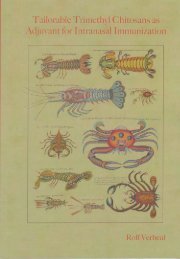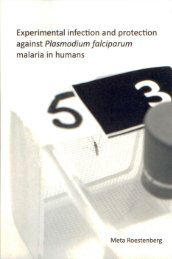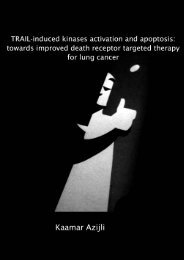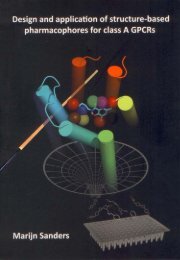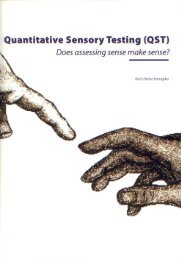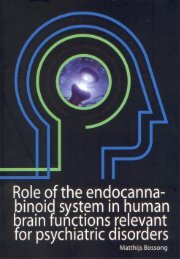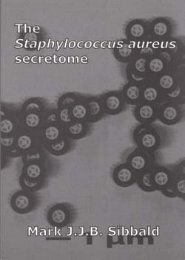TI Pharma Mid-Term Review Eindrapport
TI Pharma Mid-Term Review Eindrapport
TI Pharma Mid-Term Review Eindrapport
Create successful ePaper yourself
Turn your PDF publications into a flip-book with our unique Google optimized e-Paper software.
<strong>TI</strong> <strong>Pharma</strong> <strong>Mid</strong>-<strong>Term</strong> <strong>Review</strong> <strong>Eindrapport</strong><br />
18<br />
th r o u g h tI Ph a r m a , t h e Ne t h e r l a N d s g a I N s<br />
a h I g h ly-t r a I N e d g r o u P o f P h a r m a c e u t I c a l r e s e a r c h e r s<br />
About 340 PhD students and postdocs participate in<br />
<strong>TI</strong> <strong>Pharma</strong> programs. A large number of young researchers,<br />
therefore, are coming into contact with both the<br />
public and private sides of scientific research, receiving<br />
a good overview of the various aspects of pharmaceutical<br />
research. On top of this, <strong>TI</strong> <strong>Pharma</strong> has a strong<br />
“Education & Training” program that is unique in the<br />
world. As such, <strong>TI</strong> <strong>Pharma</strong> is training a cohort of “expert”<br />
pharmaceutical researchers.<br />
2.2 Main recommendations<br />
The Committee makes the following recommendations,<br />
which should be taken in light of the still young institute.<br />
It is understandable that a new initiative like <strong>TI</strong> <strong>Pharma</strong><br />
has not yet fine-tuned all aspects of its operation. Such<br />
matters in no way affect the core of the institute and<br />
its activities, but addressing them will help <strong>TI</strong> <strong>Pharma</strong><br />
develop new ambitions for the future:<br />
fu r t h e r q u a N t I f I c a t I o N o f t h e P e r f o r m a N c e I N d I c a t o r s<br />
<strong>TI</strong> <strong>Pharma</strong> has made an important first step in the<br />
development of quality and performance indicators.<br />
The identification, testing and measuring of accurate<br />
performance indicators and the comparison of results<br />
with goals that had been previously set is a continuous<br />
process which requires continuous refinement. <strong>TI</strong> <strong>Pharma</strong><br />
should better quantify its objectives before the next evaluation<br />
round (e.g. goals for the number of patents, publications,<br />
spin-outs, clinical applications and new or continued<br />
partnerships). In cooperation with the other Dutch<br />
Top Institutes, a basic set of indicators has been made.<br />
<strong>TI</strong> <strong>Pharma</strong> should expand upon these. <strong>TI</strong> <strong>Pharma</strong> should<br />
also actively monitor the career progress of PhDs and<br />
postdocs who have been involved in a <strong>TI</strong> <strong>Pharma</strong> project,<br />
and, for example, include comparisons with PhDs and<br />
postdocs who have not worked within <strong>TI</strong> <strong>Pharma</strong>.<br />
es t a b l I s h m e N t o f t h e P r e c o N d I t I o N s<br />
f o r a c t I v e P o r t f o l I o m a N a g e m e N t<br />
Active portfolio management consists of three elements:<br />
• the development of the portfolio;<br />
• the maintenance of the portfolio;<br />
• the project “exits”.<br />
The “open call” procedure works well; it is a transparent<br />
system in which the allocation of projects is not limited<br />
to a select group of partners and in which more than<br />
enough room exists for new entrants. The development<br />
of the portfolio will benefit from the allocation of funds<br />
to each research theme before the “open call”. This can<br />
result in a portion of the funds for the initial call remaining<br />
undistributed if the number of high-quality projects<br />
for that theme is too low, and thus to the reassessment of<br />
the strategy for subsequent calls.<br />
The anchoring of a threefold external peer review process in<br />
the “open call” procedure that was outlined in <strong>TI</strong> <strong>Pharma</strong>’s<br />
FES 2009 proposal is a positive development. This threefold<br />
peer review should be pursued by <strong>TI</strong> <strong>Pharma</strong>, forming<br />
an integral part of project assessment.<br />
It is inevitable that within a broad portfolio of 47 projects<br />
some weak projects are found. The Committee welcomes<br />
the fact that <strong>TI</strong> <strong>Pharma</strong> carries out active portfolio management.<br />
A clear strategy is necessary, one that terminates<br />
weak projects properly, reinforces successful projects and<br />
nurtures them to grow outside the bounds of <strong>TI</strong> <strong>Pharma</strong>.<br />
The Committee is of the opinion that the core of this<br />
strategy does exist, but that it must be further developed.<br />
The various “exits” for projects should be defined for<br />
each project in the form of a general procedural framework<br />
(which addresses, e.g., when to terminate projects<br />
that have had multiple poor reviews, spin-outs, continuation<br />
as public-private partnership project, continuation<br />
within one of the partners, sale/buyout of intellectual<br />
property). Such active portfolio management must also<br />
determine what occurs with PhD tracks within project<br />
consortia.<br />
eN h a N c e d c o o P e r a t I o N w I t h PrINcIPal IN v e s t I g a t o r s<br />
To a large extent, the Principal Investigators are responsible<br />
for the success of the project consortia, particularly<br />
for their work in the interaction between the public and<br />
private partners. <strong>TI</strong> <strong>Pharma</strong> should therefore strive to<br />
utilize the knowledge of the PIs as much as possible to<br />
support the continuous improvement of the research program<br />
and the identification of strategic opportunities.<br />
Communication with the PIs must also be transparent.<br />
This is particularly important for project assessment.<br />
<strong>TI</strong> <strong>Pharma</strong> should provide the PIs with clear information<br />
about these assessments and their consequences. On the<br />
other hand, regular reports from consortia should meet<br />
mandatory quality standards so that the reports can contribute<br />
to active portfolio management.



